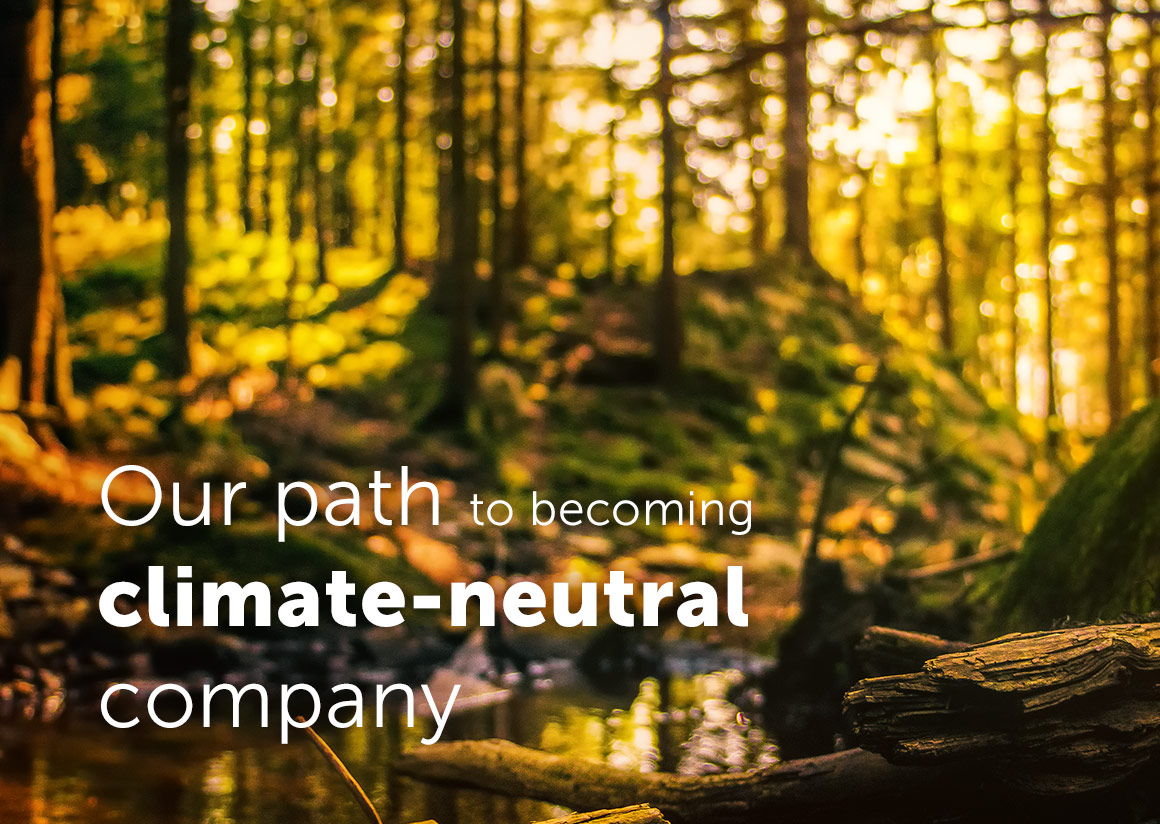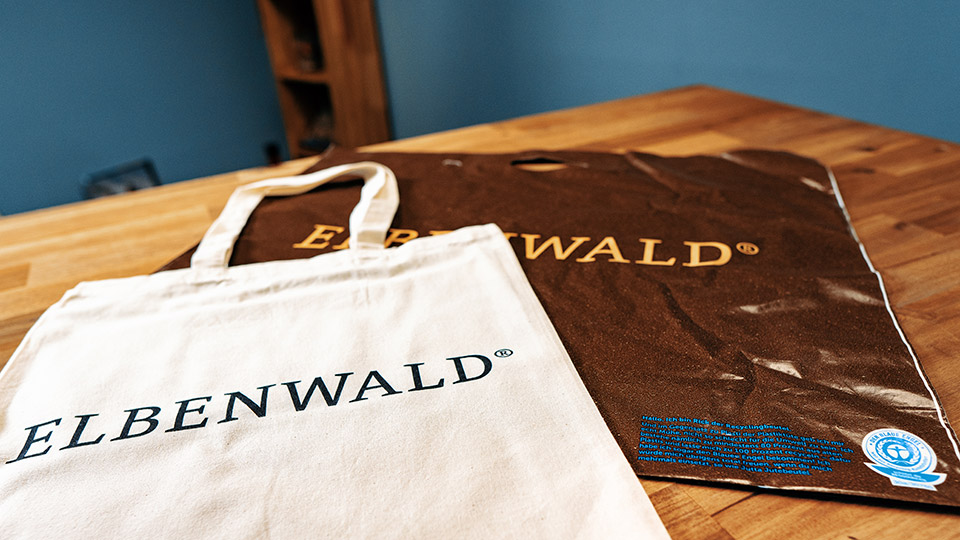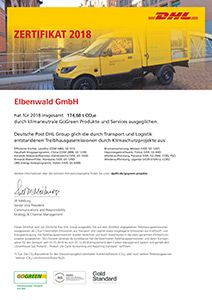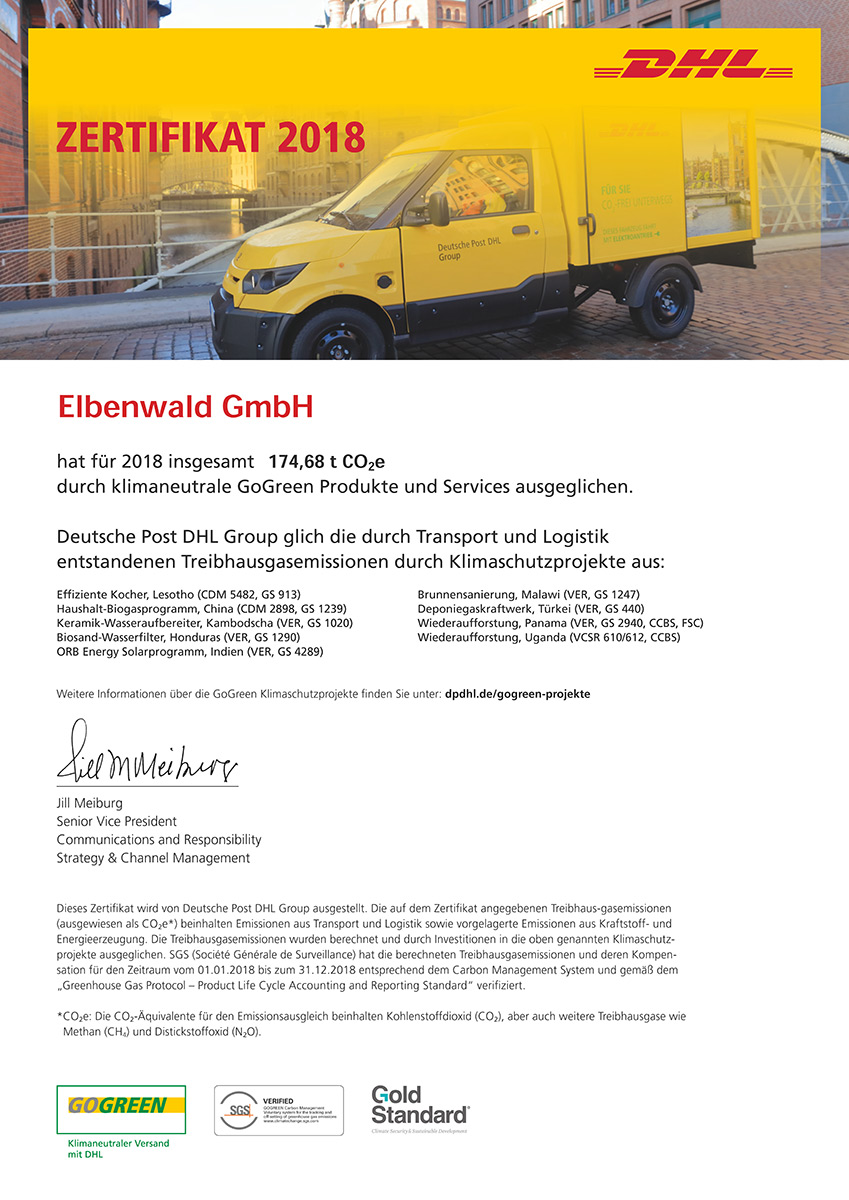
Sustainability
The easiest way for a company to address the environment looks something like this: Throw lofty figures into the room, write a few hip catchwords in capital letters and present the whole thing with pretty stock photos. There's nothing wrong with that, but it doesn't seem quite right to us because the subject is so incredibly complex. An example: announcing the renunciation of plastic bags on Instagram with a bang always goes down well. It's cool! But explaining whether or under what circumstances this helps the environment is much more difficult.
Goal: CO2-neutral company
We want to become CO2-neutral as quickly as possible. There are several ways to achieve this, for example compensation payments. At the moment, this is like the hot shit in environmental protection, and it's quick and easy. But the very best way to do something good for the environment is and remains frighteningly simple: avoid behaviour that is harmful to the climate. Take the train instead of the plane. Leave unnecessary plastic packaging on the shelf. Use the bicycle. And so on.
That is precisely the credo to which we subscribe: Avoid climate-damaging behaviour wherever possible. And where this is not possible or not yet possible, we make compensation payments. For the latter, by the way, we support the provider atmosfair, which emerged as the test winner in 2018 in the major comparison by the Siftung Warentest foundation - by far! A year earlier, the guys and gals already received the "Project Sustainability" award from the German Council for Sustainable Development. Read: They do it well.

Shipping
We started out as an online-only retailer, so shipping is by far the biggest environmental issue for us. Somehow the parcels have to get to the customer and to our shops. At the same time, we are completely dependent on logistics service providers such as DHL, which leaves us little room to change anything.
That's why we've been participating in DHL's GoGreen programme since 2010. Every year, we receive a calculation of how much CO2 was emitted through our shipping, which we then offset through payments. In 2018, for example, we paid just over 10,000 euros to support various climate projects, including reforestation in Panama and Uganda, a solar programme in India and household biogas plants in China.
Packaging
Wherever there is shipping, there is packaging. And it plays an important role in environmental protection, but from the beginning: First of all, the optimal packaging should be made of ecologically acceptable materials, meet the safety requirements for transport and, at best, be affordable. If the customer also doesn't have to pay shipping costs, that would be nice too.
We have already achieved some of this. Our shipping packaging is made of recycled material and the filling material in the parcels is largely (but not yet completely) recycled paper from Speedman. And they produce everything completely in Germany, which is also good for the transport to us - both in terms of costs and the environment. However, we must and will continue to reduce the proportion of plastic in the packaging.
So the packaging is climate-neutral, but why the hell is it often so damn big? (Usually customers ask this in a more friendly way, but we wanted something more dramatic). The simple answer: our 15,000+ products are extremely diverse and don't fit into any standard packaging. A particularly silly example is our gift cards. They're tiny, but still have to be sent as a parcel because that's the only way it's insured and can be tracked. That, by the way, was the main reason why we introduced digital gift cards.
Rick, the recycling bag
So let's talk about the bags in our shops. We affectionately call our bag Rick the recycling bag because, unlike Plasti the plastic bag, it is not quite so bad for the environment. Rick has been certified by the Blue Angel and is made of at least 80 per cent old plastic bags - and is 100 per cent recyclable.
It is not easy to say which type of bag is best for the environment. A jute bag, for example, is much worse than a plastic or paper bag in terms of pure production. The balance only tips when the bags are used several times. In the case of the jute bag, this is almost always the case, but a paper bag is often only used once. That's why we decided on the compromise with the recycling bag in the first step.

Nevertheless, we are currently in the process of rolling out a good alternative. In Austria we already have additional jute bags on offer, which you can get for a small fee instead of a Rick. And this cheap jute bag will soon also be available in Germany.
Production
"How are all our things actually made?" "Is it environmentally friendly?" "What about the working conditions?" All valid questions that you ... can't really answer. It simply depends on the product in question. And with more than 15,000 different products, we can't possibly give a detailed list for each one of them, so let's look at it more generally.
First things first: virtually all of our products are officially licensed. That's important because these products can only be manufactured at approved sites. And they are regularly inspected by the big licensors like Disney and Warner. That's why we can say with a high degree of certainty that the working conditions there are okay and that environmental protection is also taken into account (although probably with less blatant standards than in Europe).
With articles that we produce ourselves, we can look at it in more detail. Let's take our T-shirts as an example. Here we can say that all our textiles meet the Ökotex 100 standard, throughout the entire production chain. The blanks for our T-shirts are bought in from outside, but they are printed directly in Germany. In Brandenburg, to be precise.
Another example is our catalogue. Because let's face it, the most climate-neutral option would be to offer the catalogue digitally. But we are also fans of print products. Simply because it's nicer to hold something like that in your hand and browse through it than to sit in front of a screen and scroll around. (We still read real books, too.) That's why we work with a printing company that has been awarded the Blue Angel for printed products and uses FSC-certified paper and mineral oil-free inks.
What else there is
There are many more environmental issues that are not as visible as packaging and bags. Electricity, for example. In our head office there are lots of computers, cameras and mobile phones are charged, there is coffee at the touch of a button and stylish Tetris lamps hanging from the socket. In other words: a lot of electricity is consumed in a company, and in our branches anyway. That's why we already use 100 per cent green electricity from LichtBlick everywhere. They have been doing this for over 20 years and are the leading provider of green electricity and gas in Germany.
One area where we still need to improve is business travel, which is inevitable with well over 30 branches in two countries. We counteract this by avoiding unnecessary travel, using the train whenever possible (Bahncard with green electricity), and using modern, economical company cars. We offset unavoidable car journeys and flights with compensation payments.
Last but not least, we have decided to offset not only the CO2 that we produce as a company, but also the CO2 production of ALL our employees. Here we apply the average CO2 production of a Western European, which is about 8.2 tonnes per year, which we offset through compensation payments.
And now?
Better packaging, compensation payments and green electricity. Is that it? Have we saved the planet now? Of course not. These are all good initiatives, but they are only tiny little steps. If you look at the world as a whole, you have to come to the conclusion: This is not enough. If a small clique like us becomes CO2 neutral (note the use of the future tense), that's great, but it hardly changes anything in the overall situation. Many more people, especially big companies, need to get off their asses and do more for the environment. That applies to us, too. And not just here in Germany, but all over the world. Over and out.

